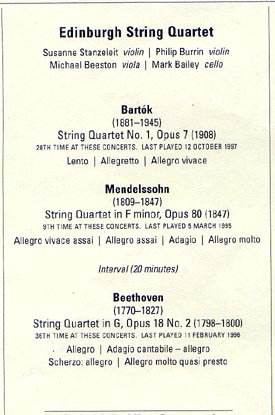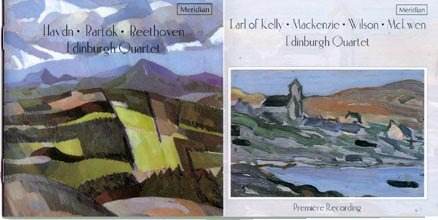
Another of those evenings spent with four players that made for as rich an
experience as can be provided by a full orchestra. Founded in 1960, the
Edinburgh String Quartet has had some changes of personnel and is
in fine form under its new leader, Susanne Stanzeleit. Theirs was
a well chosen programme in which each work reflected upon the others.
The Beethoven has some strange features, which it was a pleasure to follow on a score given to me on my 1953 birthday for a performance at the Victoria & Albert Museum by the great Vegh Quartet. The allegro middle section of the adagio is light as a Mendelssohn scherzo, and the trio of the following true scherzo has 8 bars for its first part and no less than 28 with running triplets, for the second. Beethoven was already breaking moulds. Bartok's first looks backwards and forwards, with reminders of Tristan and of the Schonberg of Verklarte Nacht, a true Hungarian style based on peasant music emerging in the eventful finale of a piece which plays without a break and, in this performance, gripped from beginning to end.
The second half was given over to Mendelssohn's angry lament for his sister, whose death did not long precede his own. It is immensely powerful, thrusting music, which demands energy and virtuosity, especially from the leader, well supplied by Susanne Stanzeleit. It was contained within bounds and true to its own time, in contrast with the unforgettable over-the-top performance which thrust the Vellinger Quartet into the finals, and to become eventual winners of the last-but-one London International String Quartet Competition.
This was all involving, thinking playing which sounded magnificent in the helpful acoustics of Conway Hall. The Edinburgh String Quartet has just released two CDs this month, including their account of the Bartok No 1 in what I found the better of the two, with Haydn 20/4 & Beethoven 18/4 (Meridian CDE 84449).
Less interesting to me is their first of Scottish music (CDE 84445) - none of it is characteristically Scottish, they concede - by the Earl of Kelly (mid 18 C), the young Alexander Mackenzie (1868) and John McEwen's Biscay quartet of 1913. Thomas Wilson's one movement 4th (1978) is well crafted and more interesting, but I felt that this ongoing project (possibly fired by everyone's needs to attract sponsorship and to have a unique niche repertoire to present?) may prove to appeal mostly to musical Scottish Nationalists; it will be interesting to find how many top-class string quartets await their championship south of the border. The playing is sound throughout, the recording rather too close in an (unnamed) and acoustically rather dry venue. Recording dates of are not provided. Meridian reprints the same text twice inside and outside the back cover of the international release, which betrays limited editorial control of the publication.

Peter Grahame Woolf
 Return to:
Return to: